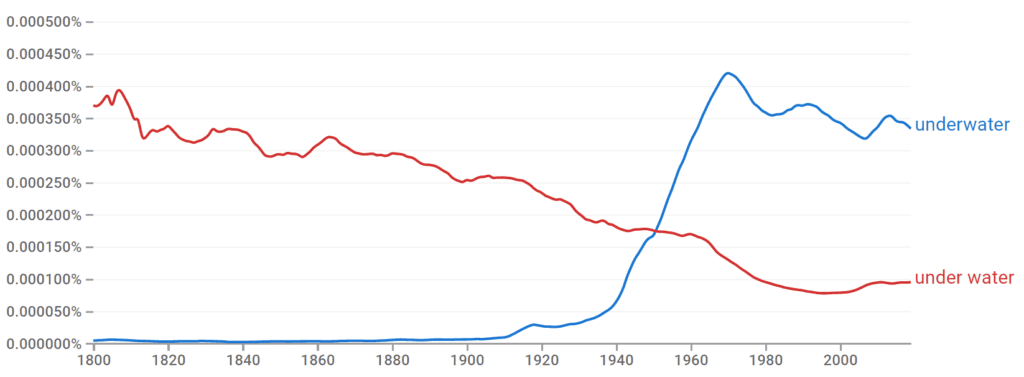Many English writers struggle to differentiate between underwater and under water because of their similar meanings. One functions as an adjective, while the other is a prepositional phrase.
I’m here to help you understand the difference between underwater vs. under water. Keep reading to know how to use the two words in sentences.
Underwater vs. Under Water

Underwater as one word refers to an adjective or adverb, while under water as two words is a prepositional phrase.
When it follows what it modifies, it is usually one word (e.g., his head was underwater), but underwater is still a fairly new compound—only about a century old—and is not 100% accepted, so some publishers still use under water when it follows what it modifies (e.g., his head was under water).
Still, underwater has become more widely used than under water since the 1920s.
When to Use Underwater
Use underwater as an adjective that means situating under the water’s surface. Remember that adjectives are usually followed by nouns as they modify places, things, persons, and events.
Example 1:
- I bought him an underwater camera for our scuba diving trip.
In this sentence, underwater modifies the noun camera. Therefore as an adjective, it should be written as one word
You can also use underwater as an adverb, which means beneath the water’s surface.
Example 2:
- We spent the whole day looking for corals underwater.
In this sentence, underwater modifies the verb looking.
Underwater Synonyms

Some synonyms for underwater include:
- Undersea.
- Submarine.
- Sub-aquatic.
- Submerged.
- Subaqueous.
- Sunken.
- Immersed.
When to Use Under Water
Use under water as a prepositional phrase, where under is the preposition and water is the object of the preposition.
Technically, underwater has the same function as under water. That’s because prepositional phrases may also act as adjectives and adverbs.
Example 3:
- The camera under water has a very low resolution.
Here, under water as an adjective tells which camera has a very low resolution. The speaker is referring to a camera that is currently beneath the water. Notice how its meaning differs from an underwater camera in example 1, which is a camera made for underwater photography.
Example 4:
- Under water, seals enjoy looking for food to eat.
In this sentence, under water is used to describes the location of seals when they enjoy looking for food. The prepositional phrase functions as an adverb.
Examples Using Underwater
Colin expressed in an interview with Entertainment Tonight about how he got panic attacks while filming a number of underwater cave scenes [Daily Mail UK].
An underwater photographer captured the beautiful world under the surface of the Norfolk sea during the heatwave [BBC].
Examples Using Under Water
Las Vegas flooding: Multiple casinos, entire Strip, airport under water [NY Post].
In Haddix, Kentucky, near-whole communities are under water. Just a few feet of elevation made the difference between this home surviving and being destroyed by the historic floods [Robert Sherman via News Week]
How to Remember the Difference
One trick to recognizing the difference is remembering that the longer term has a longer function. Under water functions as a prepositional phrase. Meanwhile, the one-word underwater is only an adjective or adverb.
Summary of Underwater vs. Under Water
The words underwater and under water have very subtle differences in meaning. Remember that underwater is an adjective or an adverb, while under water is a prepositional phrase. But then again, prepositional phrases can also be adjectives or adverbs.
